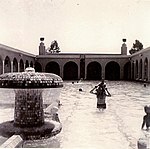Monte Vista and Diamond Mountain Vineyard
Buildings and structures completed in 1896Napa County, California geography stubsNational Register of Historic Places in Napa County, CaliforniaSan Francisco Bay Area Registered Historic Place stubs
The Monte Vista and Diamond Mountain Vineyard, at 2121 Diamond Mountain Rd. in Calistoga, California, was listed on the National Register of Historic Places in 2013. The listing included five contributing buildings and a contributing site.It is a six building farm complex and a vineyard.The property, then a 120 acres (49 ha) area on the eastern slope of Diamond Mountain, was purchased by Andrew Rasmussen, an immigrant from Denmark, from George W. Briggs in 1895. Ramussen commissioned the building of a farmhouse, carriage house and barn by a John Bradbury.It was a single family farm until Prohibition began in 1920.
Excerpt from the Wikipedia article Monte Vista and Diamond Mountain Vineyard (License: CC BY-SA 3.0, Authors).Monte Vista and Diamond Mountain Vineyard
Diamond Mountain Road,
Geographical coordinates (GPS) Address Nearby Places Show on map
Geographical coordinates (GPS)
| Latitude | Longitude |
|---|---|
| N 38.543611111111 ° | E -122.58 ° |
Address
Diamond Mountain Road 2121
94515
California, United States
Open on Google Maps







